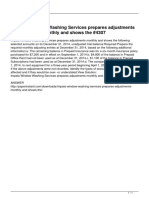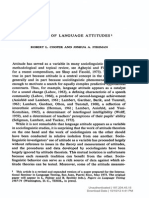Professional Documents
Culture Documents
Class Activity 1
Class Activity 1
Uploaded by
awazOriginal Description:
Copyright
Available Formats
Share this document
Did you find this document useful?
Is this content inappropriate?
Report this DocumentCopyright:
Available Formats
Class Activity 1
Class Activity 1
Uploaded by
awazCopyright:
Available Formats
CLASS ACTIVITY 1
Below you will find an excerpt from a manager’s meeting, where the possibility of conducting market
research is being discussed. Your task here is to outline the reasons for and against of undertaking the
study and then to determine whether or not the research should be conducted.
Jane:
OK team, we’re getting near the end of the project, time to discuss the merits of a market test (test
market). Personally, I’m keen on a market test as the successful launch and fast adoption of our
product is a key success factor.
Jack:
I’m going to disagree. I’m a ‘speed-to-market’ sort of guy. Look it’s a good product. It’s got success
written all over it. Let’s just get it out there and the product will do the rest.
Mike:
Sure Bruce, it’s a good product. But unless it’s well promoted, widely available, and consumers clearly
understand its benefits – it just won’t sell well. A market test will give us valuable information so we can
market it effectively.
Harry:
But do we really need that information? We’re professional managers, we’ve all been through major
product launches before. I’m sure that between us we can work out the best launch strategy without the
need for extra information.
Simon:
Well I’m not so sure Harry. I’ve said it before, and I’ll keep saying it. This product is so critical – it’s just
too important – we must test it and get it right.
Mary:
To add to this discussion, I’m going to put my finance hat on. We’re talking a big expense. This product
already has a big investment to recover and adding another few hundred thousand plus is a big ask!
Lyn:
Personally, I think that undertaking more research sends a bad signal to the executive team that we’re
really not confident in the product’s likely success.
Darcy:
That could be true. But I’ve heard rumours that a few of our competitors are in development of a similar
product. We need to go now or we’ll possibly lose our “first-to-market” advantage. I think that the
executive team would be very disappointed if a competitor beat us to the marketplace.
Anna:
I’m sure that some of you feel like I do. We’ve been working on this project for over two years and it
would be good to skip the research and just push the product out now. But we’re professional. We’re
paid to make the right decisions. So let’s objectively weigh up the pros and cons and make the right
decision for the firm.
QUESTIONS
1. What are the arguments for conducting the market research?
2. Outline the concerns with undertaking this research study.
3. Given your responses to Q1 and Q2, what would you advise the firm to do in regards to
conducting the study? Why?
CLASS ACTIVITY 2
The first step in the market research process is defining the problem. There are suggestions that this is
the most difficult stage. When you first hear this statement it sounds strange – how can the firm not
know its own problem? Well hopefully this activity will help clarify that situation. The following firm is
looking to undertake some market research, but they first need to define the research problem – can
you help them?
ACTIVITY/TASK
Mitchell:
I think we all know why we’re here. Our last advertising campaign, which cost over $5m, has not had
any real impact on our sales levels. We need to find out what went wrong and fast!
Lyn:
Well to do that we will need to conduct some market research; I’ll brief the research agency straight
after this meeting.
Caitlin:
But what are they going to research? This situation could have been caused by a number of factors.
For instance, it could have been the media buy, or the ads themselves, or the fact that we just used
television ads without any other support, particularly online.
Garrett:
Maybe it wasn’t the ads at all. It could have been more aggressive competitor activities over the past
few months.
James:
Or maybe it was something that we did. Did we change our pricing during the period? Did we reduce
sales promotions because the money was going into heavy advertising instead?
Wilson:
I’ll have to check those details, but it’s a possibility. If we did reduce our sales promotions, then maybe
we don’t have a problem at all. Perhaps our advertising has increased the value of the brand and we
are now selling the same as before without the need to offer discounts and incentives.
Mitchell:
OK, there are a number of possibilities. Let’s start by making a list of all of the possibilities. Then we’ll
review the list and identify the most likely problem areas for further research.
QUESTIONS
1. What are the possible problem areas that the firm should be investigating?
2. Given your list in Q1, what are the most likely problem areas?
3. How would you define the market research problem for this firm?
4. After completing this exercise, do you think is generally easy or difficult to define the market
research problem?
5. What would be the implications of defining a market research problem incorrectly?
You might also like
- The Adventures of The Dying Detective - PlayDocument21 pagesThe Adventures of The Dying Detective - PlaySmiley Minnie100% (1)
- NetiquetteDocument2 pagesNetiquetteVirginia Canabal100% (3)
- Andres BsaDocument17 pagesAndres BsaDeepak PuriNo ratings yet
- AEO - LBO Scenario #1a, Case 1 OverviewDocument4 pagesAEO - LBO Scenario #1a, Case 1 Overviewmilken466No ratings yet
- SageX3 Financials Consultant Study Guide - v1 - 1Document4 pagesSageX3 Financials Consultant Study Guide - v1 - 1VIKAS ANNEBOYINA0% (1)
- Suggested Answer To ACJC Question 2-1Document4 pagesSuggested Answer To ACJC Question 2-1Kenrick KiletNo ratings yet
- Exam 1 Review QuestionsDocument5 pagesExam 1 Review QuestionsAngelicaNo ratings yet
- Impala Window Washing Services Prepares Adjustments Monthly and Shows TheDocument1 pageImpala Window Washing Services Prepares Adjustments Monthly and Shows TheHassan JanNo ratings yet
- Grocery Gadget Quick Guide For Iphone and Ipod TouchDocument33 pagesGrocery Gadget Quick Guide For Iphone and Ipod TouchFlixoftNo ratings yet
- Embodied Reactive AgentsDocument5 pagesEmbodied Reactive AgentsIsrael LVNo ratings yet
- Rainbow Council BSA 2012 Audit RFPDocument3 pagesRainbow Council BSA 2012 Audit RFPBrianMcDaniel100% (1)
- CUEGISDocument3 pagesCUEGISkrishivNo ratings yet
- Ets MFTDocument64 pagesEts MFTfioNo ratings yet
- Vra Essay 1Document5 pagesVra Essay 1api-490182249No ratings yet
- HLA-Policy Change Application FormDocument4 pagesHLA-Policy Change Application FormJinieNo ratings yet
- Lessons Learned Paper - Chris StecklerDocument2 pagesLessons Learned Paper - Chris Stecklerapi-310933101No ratings yet
- Elliott 1993 - Service Quality in The Airline Industry PDFDocument13 pagesElliott 1993 - Service Quality in The Airline Industry PDFSari AnastasiaNo ratings yet
- EULA IV Report First EditionDocument11 pagesEULA IV Report First EditionMelissa JordanNo ratings yet
- Hardhat QDocument2 pagesHardhat QHendro Siallagan0% (1)
- Digital Unit Plan-Ratios and Proportional RelationshipsDocument4 pagesDigital Unit Plan-Ratios and Proportional Relationshipsapi-321835642No ratings yet
- Deer Predation or Starvation LessonDocument5 pagesDeer Predation or Starvation Lessona100% (1)
- Sim VentureDocument4 pagesSim VenturejorjNo ratings yet
- Postcolonial Urban ApartheidDocument3 pagesPostcolonial Urban ApartheidCristina MarcelloNo ratings yet
- Writing A Good PRDDocument26 pagesWriting A Good PRDJames McKernan100% (2)
- ACC601 Xero Assignment S2 2019Document11 pagesACC601 Xero Assignment S2 2019awazNo ratings yet
- ACC601 Xero Assignment S2 2019Document11 pagesACC601 Xero Assignment S2 2019awazNo ratings yet
- Sample Criminal Complaint For Violation of RA 9262Document3 pagesSample Criminal Complaint For Violation of RA 9262Inquiry PVM100% (2)
- Herbie HancockDocument3 pagesHerbie HancockDidi102100% (1)
- Hemophilia PDFDocument135 pagesHemophilia PDFJavier Alvarez100% (1)
- 29 - 908941 - As Business Studies Total Quality Management Case StudyDocument2 pages29 - 908941 - As Business Studies Total Quality Management Case StudyAbhishek ChaudharyNo ratings yet
- Adobe Font Folio: The Complete Type Solution For Design ProfessionalsDocument2 pagesAdobe Font Folio: The Complete Type Solution For Design ProfessionalsJulio SanchezNo ratings yet
- CA ITCM Release NotsDocument135 pagesCA ITCM Release Notsjaved7485No ratings yet
- Prita Jha - Shelters - Counselling and Service Providers and Legal Aid PDFDocument4 pagesPrita Jha - Shelters - Counselling and Service Providers and Legal Aid PDFRajesh MohananNo ratings yet
- WUSC SRP Profile Form-Guidelines For StudentsDocument3 pagesWUSC SRP Profile Form-Guidelines For StudentsxsjcNo ratings yet
- Greenhand Banquet ScriptDocument5 pagesGreenhand Banquet Scriptapi-390592034No ratings yet
- RFP OverviewDocument3 pagesRFP OverviewPatrick CoffeeNo ratings yet
- Aspire Registration Form 10Document2 pagesAspire Registration Form 10api-250691083No ratings yet
- TED2010 Tom Wujec Marshmallow Challenge Web VersionDocument62 pagesTED2010 Tom Wujec Marshmallow Challenge Web Versionalberto_cohenNo ratings yet
- Defining The Market Research ProblemDocument1 pageDefining The Market Research Problemzoha nabeelNo ratings yet
- Drivers of Chain in Selling in Sales ManagementDocument9 pagesDrivers of Chain in Selling in Sales ManagementRafaiza ManoNo ratings yet
- Measurement, Analysis and OptimizationDocument31 pagesMeasurement, Analysis and OptimizationTomás Agustín AlassiaNo ratings yet
- Social Media Advertising StrategyDocument36 pagesSocial Media Advertising StrategyMood MechanicNo ratings yet
- Smarter Marketer: 11 Golden Rules to Help in-House Marketers Thrive in an Ever-Changing DigitFrom EverandSmarter Marketer: 11 Golden Rules to Help in-House Marketers Thrive in an Ever-Changing DigitNo ratings yet
- Session Agenda: Company Case - Chapter 4 - Class ActivityDocument20 pagesSession Agenda: Company Case - Chapter 4 - Class ActivityZaid NaveedNo ratings yet
- Questionnaire Sales MGMTDocument6 pagesQuestionnaire Sales MGMTsonamkhanchandaniNo ratings yet
- Marketing Interview Questions and Answers Guide.: Global GuidelineDocument30 pagesMarketing Interview Questions and Answers Guide.: Global GuidelineAMITAVA ROYNo ratings yet
- Questions 2Document3 pagesQuestions 2Abhishek VermaNo ratings yet
- Top 20 Social Media Coordinator Interview QuestionsDocument8 pagesTop 20 Social Media Coordinator Interview QuestionsMimyNo ratings yet
- 13 Insights From Y CombinatorDocument19 pages13 Insights From Y CombinatorRaghuram SheshadriNo ratings yet
- Ses 9 - The Fifth P in MarketingDocument5 pagesSes 9 - The Fifth P in MarketingJahja AjaNo ratings yet
- Reflective ReportDocument7 pagesReflective ReportHND Assignment HelpNo ratings yet
- Marketing Concepts BCG MatrixDocument31 pagesMarketing Concepts BCG MatrixarunspeakersNo ratings yet
- What Is Reach and What Is CoverageDocument10 pagesWhat Is Reach and What Is CoverageSumit SumanNo ratings yet
- Ebook Startup 101Document20 pagesEbook Startup 101Hamza kashifNo ratings yet
- Market Researcher InterviewDocument2 pagesMarket Researcher InterviewVictor OrdoñezNo ratings yet
- The Dumbest Man in The Room PDFDocument80 pagesThe Dumbest Man in The Room PDFCristian AndreiNo ratings yet
- A Three-Step Framework For Solving ProblemsDocument10 pagesA Three-Step Framework For Solving Problemsstudent1 studentNo ratings yet
- Goodprd PDFDocument27 pagesGoodprd PDFRidwan IchsanNo ratings yet
- 3 Lead QualificationDocument5 pages3 Lead QualificationRodrigoBuenoNo ratings yet
- The Drive Interview®: Pair Your Drivetest® Results With Our Behavior Sales Interview For Maximum ResultsDocument8 pagesThe Drive Interview®: Pair Your Drivetest® Results With Our Behavior Sales Interview For Maximum ResultsUma ArbyNo ratings yet
- Transform Datas Impact Pick The Right Success KPIDocument8 pagesTransform Datas Impact Pick The Right Success KPIMing MingNo ratings yet
- Spin Selling SolDocument4 pagesSpin Selling SolTiffany Barnes100% (1)
- Case Studies For Content Management System On Social Media PDFDocument19 pagesCase Studies For Content Management System On Social Media PDFSaloni SharmaNo ratings yet
- 2014 Market ResearchDocument45 pages2014 Market ResearchUppiliappan GopalanNo ratings yet
- Change Management OnlineDocument94 pagesChange Management OnlineawazNo ratings yet
- RPL Template v3Document83 pagesRPL Template v3awazNo ratings yet
- Change Management OnlineDocument94 pagesChange Management OnlineawazNo ratings yet
- Guidelines For Oral PresentationsDocument3 pagesGuidelines For Oral PresentationsawazNo ratings yet
- Week 5goproDocument22 pagesWeek 5goproawaz100% (1)
- MKT601 Topic 4 - Consumer BehaviourDocument18 pagesMKT601 Topic 4 - Consumer BehaviourawazNo ratings yet
- Team Member RatingDocument3 pagesTeam Member RatingawazNo ratings yet
- Assessment 1 Report Brief MGT808 Sem1 2020Document5 pagesAssessment 1 Report Brief MGT808 Sem1 2020awazNo ratings yet
- MKT601 Topic 2 - Strategic Planning in Contemporary MarketingDocument18 pagesMKT601 Topic 2 - Strategic Planning in Contemporary MarketingawazNo ratings yet
- Eco600 - Week 3Document25 pagesEco600 - Week 3awazNo ratings yet
- R3 - Daly Vs Lomborg - Limit Growth or NotDocument8 pagesR3 - Daly Vs Lomborg - Limit Growth or NotawazNo ratings yet
- ECO600 - Exercise Sheet - Week 2 - SDocument5 pagesECO600 - Exercise Sheet - Week 2 - SawazNo ratings yet
- Taj Hotel PDFDocument36 pagesTaj Hotel PDFawazNo ratings yet
- Assessment 1 Marking Rubric 2020 - Sem-1Document2 pagesAssessment 1 Marking Rubric 2020 - Sem-1awazNo ratings yet
- ECO600 - Assessment Template - Mid-Term Exam July 2019Document2 pagesECO600 - Assessment Template - Mid-Term Exam July 2019awazNo ratings yet
- Breakfast Mo:Mo'S Steam Fry CDocument3 pagesBreakfast Mo:Mo'S Steam Fry CawazNo ratings yet
- 9 Moral-Ethical DilemmasDocument3 pages9 Moral-Ethical Dilemmasapi-314003507No ratings yet
- Harry Bober, The Zodiacal Miniature of The Très Riches Heures of The Duke of BerryDocument46 pagesHarry Bober, The Zodiacal Miniature of The Très Riches Heures of The Duke of BerryJefferson de Albuquerque100% (1)
- Popular Literature and High Literature in AmericaDocument4 pagesPopular Literature and High Literature in AmericaMuhammad Rafif Izzuddin ArkanNo ratings yet
- Active Listening Dale Carnegie - ArticleDocument2 pagesActive Listening Dale Carnegie - ArticleSakshi YadavNo ratings yet
- UEH ExceptionsDocument17 pagesUEH ExceptionsIvan BagusNo ratings yet
- 1800flowers Facebook Ad Case StudyDocument3 pages1800flowers Facebook Ad Case StudySocial Fresh Conference100% (1)
- Research 2122 First Quarter ExamDocument25 pagesResearch 2122 First Quarter ExamKenberly DingleNo ratings yet
- Economic and Political Weekly Economic and Political WeeklyDocument6 pagesEconomic and Political Weekly Economic and Political WeeklyNitin GuptaNo ratings yet
- Desiderata Max Ehrmann Themes PositivityDocument2 pagesDesiderata Max Ehrmann Themes Positivitymanisha choudharyNo ratings yet
- Kuki SafeguardDocument20 pagesKuki SafeguardHenchakipgen HenchakipgenNo ratings yet
- Dllweek 1Document3 pagesDllweek 1KarlaColinaNo ratings yet
- Cognitive Observation 1Document6 pagesCognitive Observation 1api-309089718No ratings yet
- Screw Compressor Packages Grasso Ssp1 Smart Screwpack Operating InstructionsDocument72 pagesScrew Compressor Packages Grasso Ssp1 Smart Screwpack Operating InstructionsMarcu TeodorNo ratings yet
- Case Study - Glasgow Tower Project - FinalDocument11 pagesCase Study - Glasgow Tower Project - Finalkyledoyle0% (1)
- Techniques On Vertical Ridge Augmentation: Indications and EffectivenessDocument30 pagesTechniques On Vertical Ridge Augmentation: Indications and Effectivenessrmartins76No ratings yet
- The Management, Role and Training of Learning Support AssistantsDocument109 pagesThe Management, Role and Training of Learning Support AssistantsRosy NguyenNo ratings yet
- Sika ViscoCrete-225 SDocument2 pagesSika ViscoCrete-225 SMajid AlzubadyNo ratings yet
- Grade 8 2nd ExamDocument12 pagesGrade 8 2nd ExamJash BaldonNo ratings yet
- MAE4242 - Ch04 - Longitudinal Control PDFDocument30 pagesMAE4242 - Ch04 - Longitudinal Control PDFMatthew AustinNo ratings yet
- ENGINEERING FIELD MANUAL - Chapter 3Document116 pagesENGINEERING FIELD MANUAL - Chapter 3Vicio SammartanoNo ratings yet
- A Movement RisingDocument22 pagesA Movement RisingDejan ŠešlijaNo ratings yet
- Home HustleDocument4 pagesHome Hustleapi-506702869No ratings yet
- Barrion Psychological Evaluation Report Bsp3Document5 pagesBarrion Psychological Evaluation Report Bsp3Krisha Geile Javier BarrionNo ratings yet
- Kalaw V Fernandez DigestDocument3 pagesKalaw V Fernandez Digestnina100% (1)
- Language Teaching MethodologyDocument32 pagesLanguage Teaching Methodologygigipatata100% (1)
- The Study of Language AttitudesDocument16 pagesThe Study of Language Attitudesjulianajuana100% (1)









































































































